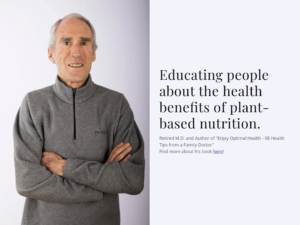 DIET AND HORMONE-RELATED FEMALE DISORDERS
DIET AND HORMONE-RELATED FEMALE DISORDERS
Health column by Dr. Greg Feinsinger. Champion of Whole Food Plant Based Living and righteous person.
Last week’s column was about diet and male and female infertility. The following points were made: 1) Excess body fat manufactures estrogen and androgen, causing a hormone imbalance that decreases fertility. 2) Achieving and maintaining ideal body weight improves fertility. 3) Eating fiber—found only in plants—pulls excess estrogens out of the body via the colon. 4) Milk, cheese, and other dairy products contain excess estrogen from cows, and avoiding these things decreases infertility in both men and women.
In his book “Your Body in Balance, The New Science of Food, Hormones, and Health,” Dr. Neal Barnard—well-known medical scientist and author, and founding president of PCRM (Physician Committee for Responsible Medicine)—talks about other female maladies and diet:
- MENSTRUAL PAIN. Painful periods affect quality of life and are a common cause of school and work absence. Every month in pre-menopausal women, the lining of the uterus is shed (menstruation), a process that releases prostaglandins—which cause crampy pain. Estrogen causes growth of the endometrial lining, and excess estrogen causes excessive thickening, resulting in heavier and more painful periods.
- ENDOMETRIOSIS is a condition where cells that make up the endometrium—the lining of the uterus– grow outside of the uterus in areas such as the ovaries and fallopian tubes, causing chronic pain and often infertility. Reducing estrogen levels—especially if excessive—can be helpful and even curative.
- ADENOMYOSIS is where endometrial cells end up in the uterine muscle, which can cause menstrual pain, heavy flow, and pain during intercourse. Again, lowering excessive estrogen levels can help.
- FIBROIDS are benign tumors in the uterine muscle. Estrogen makes fibroids grow, and they often shrink when estrogen levels drop with menopause. Fibroids often lead to surgical removal or hysterectomy. But why go through the expense and risk of complications associated with surgery when an estrogen-lowering diet can be helpful?
- PREMENSTRUAL SYNDROME is a constellation of physical and emotional symptoms occurring in some women for a few to several days before each period. PMS affects quality of life. Dr. Barnard has conducted studies that show that for most women with PMS, a plant-based diet is helpful. Here is a summary of Dr/ Barnard’s helpful measures to reduce symptoms of PMS: 1) Avoid all animal products, particularly dairy. 2) Avoid added oils. 3) Eat plant-protein-rich foods first thing in the morning, such as tofu or tempeh or other beans. 4) Avoid sugar, and some women do better if they avoid chocolate (sorry!). 5) Minimize caffeine and alcohol. 6)Take a B12 supplement. 7)) Exercise regularly. 6) Get adequate sleep. 7) Get out in the sun, which is a mood-booster.
In summary, imbalance of female hormones causes many health issues in women. Fat cells manufacture excess estrogen and androgen, and levels become balanced as normal weight is achieved. Avoid estrogen in dairy products. Eat plenty of fiber—found in fruit, vegetables, legumes, and unprocessed grain—which removes excess estrogen via the GI tract.
Leave a Reply